Author
Rebecca Robinson
Data Analyst (Higher Education Insight), QAA
NSS 2025 summary
Introduction
The National Student Survey (NSS) is a survey of final year undergraduates at higher education providers across the UK. Carried out between January and April each year, the survey asks 24 core questions split into seven themes. For each question there are four answer options – two positive and two negative. Results for the 2025 survey were published on Wednesday 9 July.
In this report we summarise results at the sector level and highlight QAA resources that can support enhancement around each of the survey’s themes. Results are presented in terms of the positivity measure – the proportion of all respondents to the question who answered with one of the two positive response options.
UK-level results
At the UK level, positivity across all themes has improved for the second year running, with the biggest improvements coming in student voice and organisation and management.
As in 2024, learning resources, academic support and teaching on my course are the strongest themes while student voice, although improving, remains the weakest theme.
Positivity has improved across all themes for the second year in a row
Positivity measure by theme over time from 2023 to 2025
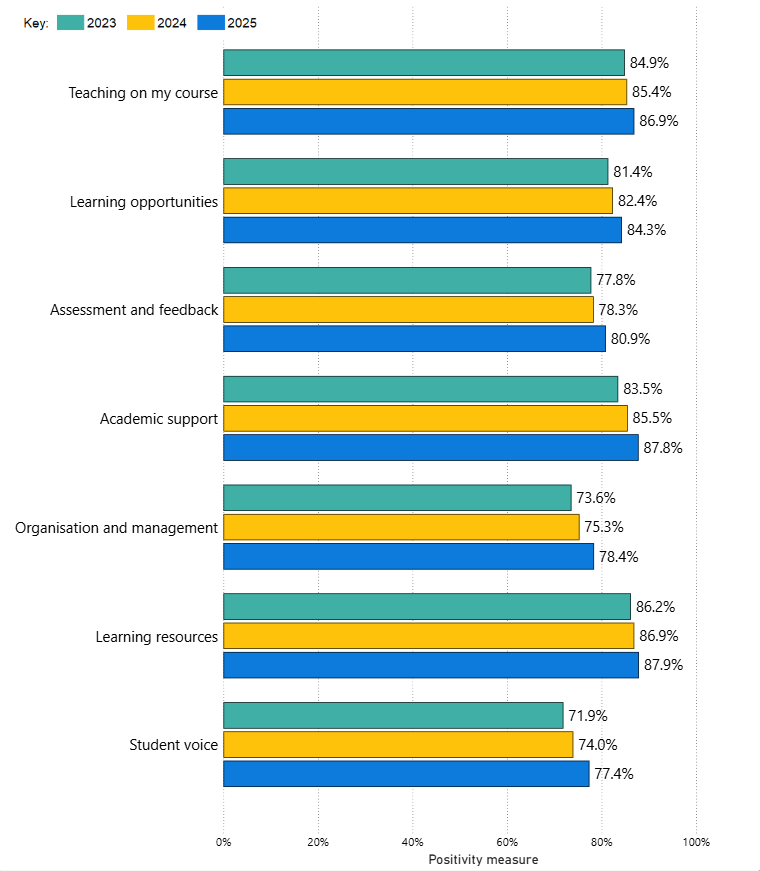
1. Teaching on my course
At a glance
- Respondents are most positive, across all questions in the survey, about how good teaching staff are at explaining things. In 2025, 92.6% responded positively, a 1.5 percentage point increase from 2024.
- The area with the biggest improvement was the extent to which teaching staff make the subject engaging, with 82.7% of students responding positively, up 1.8 percentage points on 2024.
- When asked whether the course is intellectually stimulating, 85.5% of respondents gave a positive response, up on the previous year’s figure of 84.6%.
- There was also improvement in opinion on how often the course challenges students to achieve their best work. This measure rose by 1.7 percentage points, reaching 86.9% in 2025.
Respondents are most positive about how well teaching staff explain things
Positivity measure by question for the teaching on my course theme
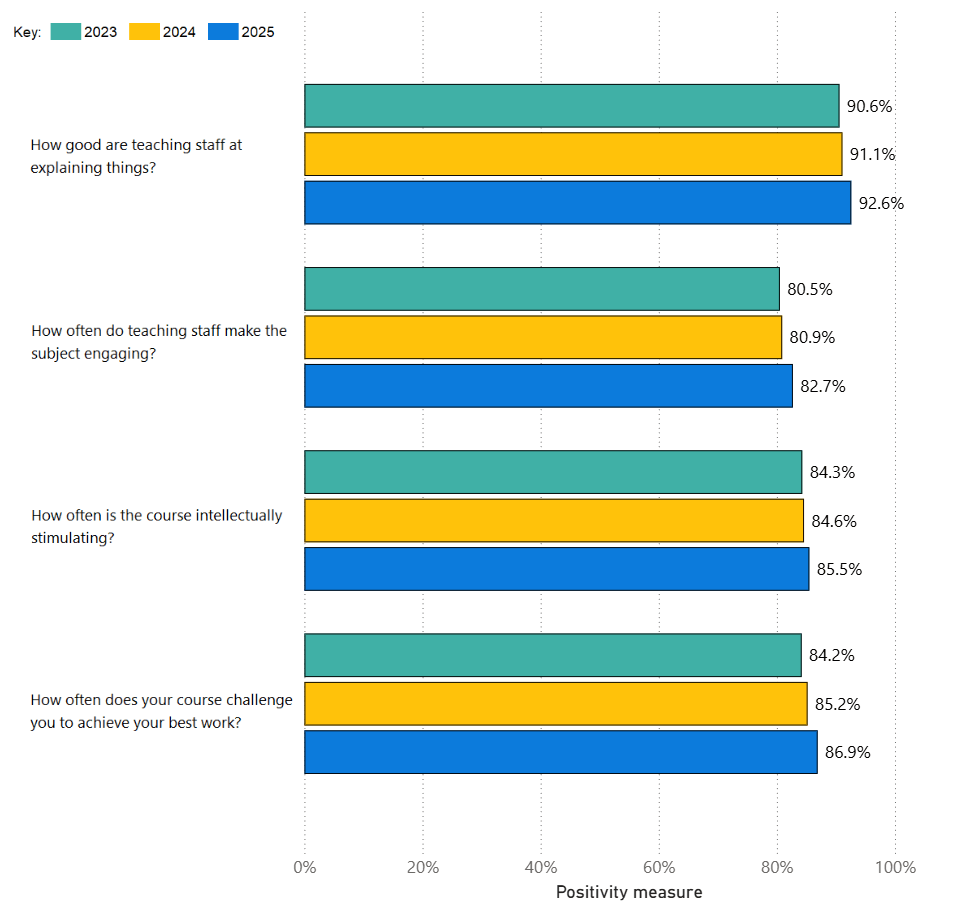
QAA resources
We have a range of QAA resources that you can use to enhance learning and teaching within modules and programmes, as well as learning and resources from our Collaborative Enhancement Projects that seek to enhance learning, teaching and employability.
Membership Resources on Teaching and Learning
Collaborative Enhancement Projects on Learning, Teaching and Employability
2. Learning opportunities
At a glance
- Results in the learning opportunities theme are relatively consistent with each other – over 85% of respondents are positive about being able to explore ideas in depth, how well their course builds on what they’ve already learned, opportunities to bring different topics together and whether they’ve learnt skills that they’ll need for the future.
- Respondents are less positive about whether their course has the right balance between directed and independent study (79.4%), though this has improved compared to previous years.
Positivity is lowest when considering the balance between directed and independent study
Positivity measure by question for the learning opportunities theme
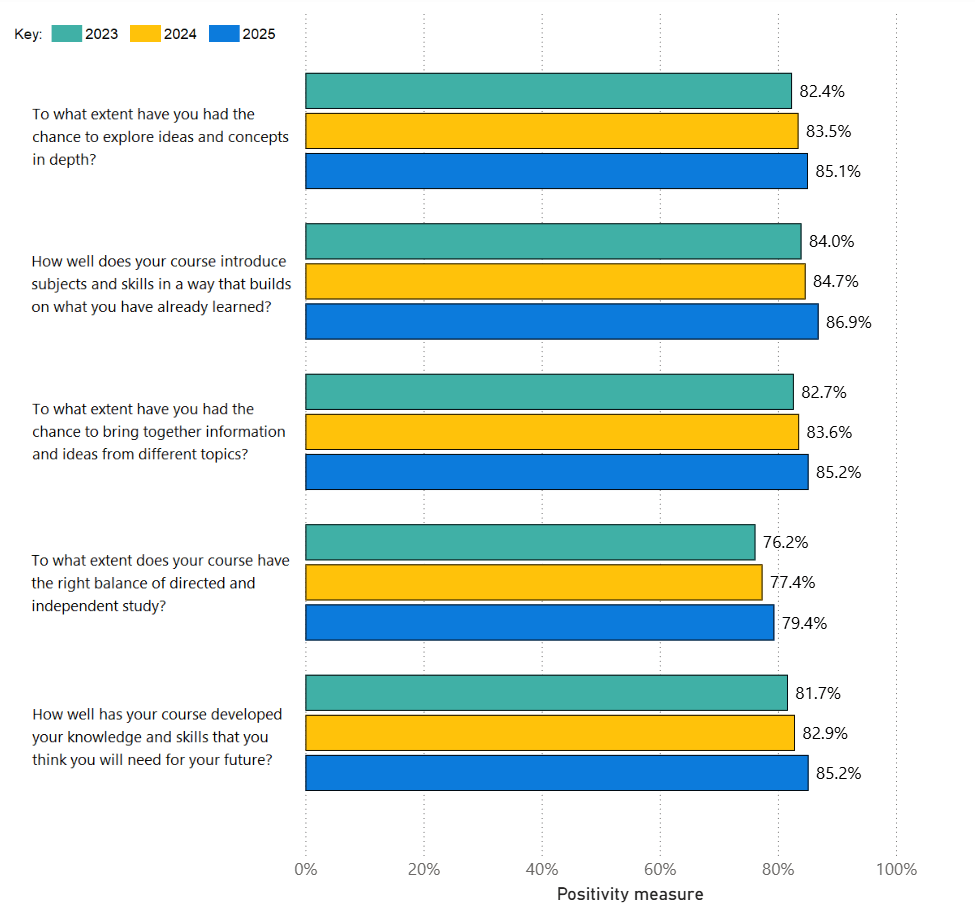
Additional findings
Positivity about the balance between directed and independent study varies across subjects – respondents studying medicine and dentistry are least positive (68.1%) while business and management students are most positive (85.2%).
QAA resources
Our Membership Resources Site contains a wide range of content that can be used to enhance student learning opportunities and future-focused skills development.
Membership Resources on Teaching and Learning
Membership Resources on Enterprise and Entrepreneurship
Collaborative Enhancement Projects on Learning, Teaching and Employability
3. Assessment and feedback
At a glance
- While assessment and feedback is one of the weaker themes overall, there has been improvement year on year. All questions in this theme saw improvement of over two percentage points this year.
- Respondents are most positive about how well assessments let them demonstrate what they’ve learned – 84.4% responded positively to this question, up from 81.8% in 2024.
- Over four-fifths of respondents feel that marking and assessment on their course has been fair (83.5%) and are positive about the timeliness of feedback (83.3%). Respondents are less positive about the clarity of marking criteria (78.1%).
- Respondents are least positive about how useful the feedback they receive is – 75.2% feel that feedback often helps them improve their work.
Opinions on assessment and feedback have shown improvement this year
Positivity measure by question for the assessment and feedback theme
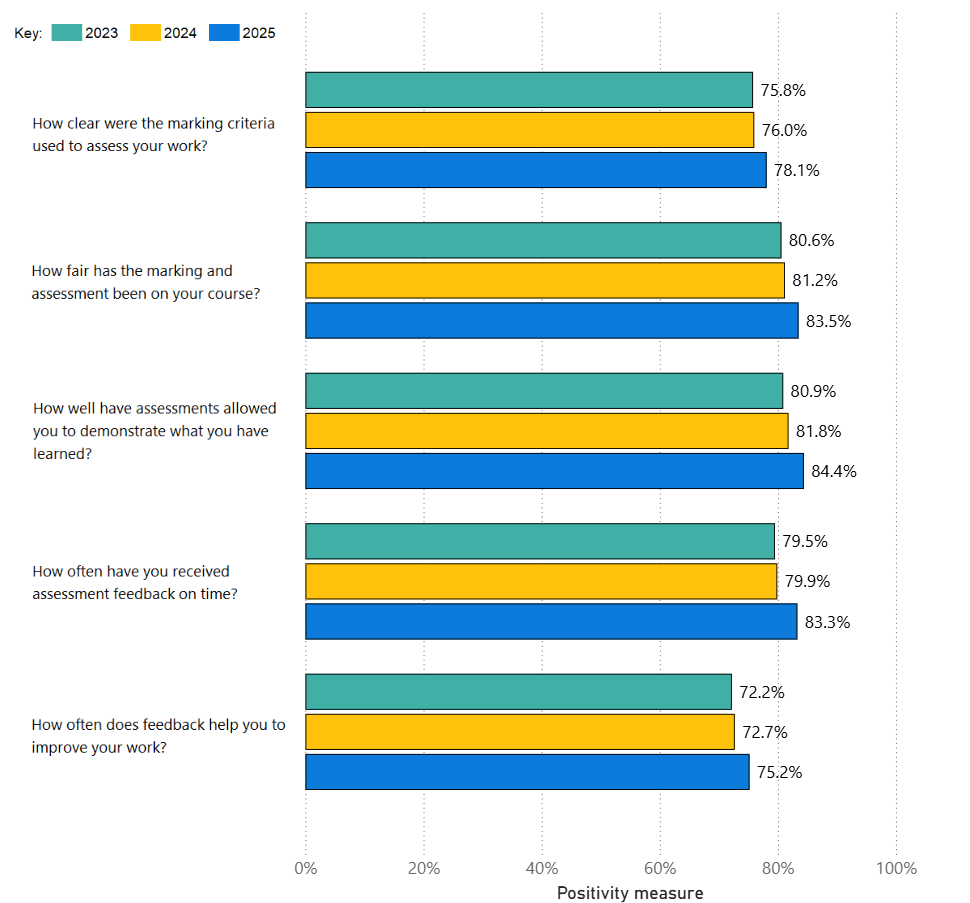
Additional findings
How often assessment feedback is returned on time varies by subject – 93.2% of education and teaching respondents said they often receive feedback on time compared to 73.2% of engineering and technology respondents.
There is also subject variation in how often feedback helps students to improve their work, ranging from 81.4% of design and creative and performing arts respondents answering positively to 61.2% of medicine and dentistry students.
QAA resources
QAA has dedicated resources on the enhancement of assessment practices, ranging from a student guide to making sense of assessment to Collaborative Enhancement Projects on assessment literacy, inclusive assessment and compassionate assessment.
Membership Resources on Assessment
Collaborative Enhancement Projects on Assessment
Also, keep an eye on the QAA website for information and dates for the upcoming QAA Festival of Assessment and Feedback being held in spring 2026.
4. Academic support
At a glance
- Academic support is one of the strongest areas of the survey and responses have also improved over time.
- The majority of respondents feel that it was easy to contact teaching staff when needed (87.5%) and that their learning was well supported by teaching staff (88.1%).
Responses to both questions about academic support saw improvement this year
Positivity measure by question for the academic support theme
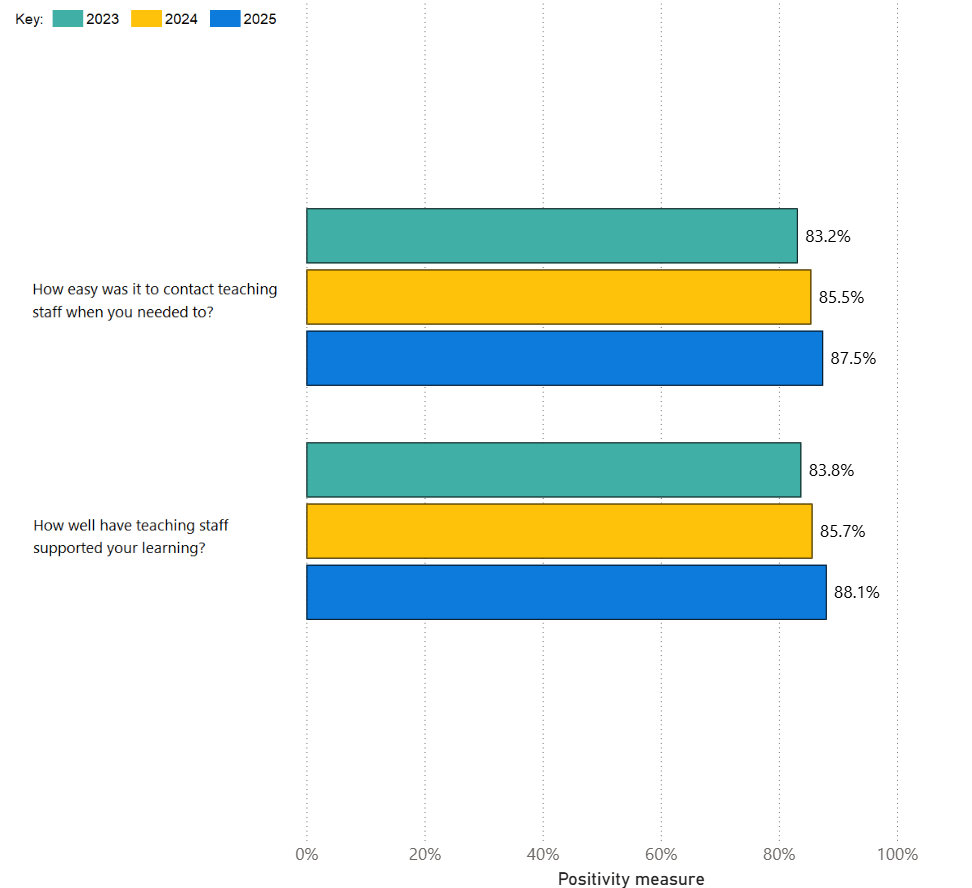
Additional findings
Students of subjects allied to medicine are significantly more positive this year that it’s easy to contact teaching staff when needed (an improvement of four percentage points from 79% to 83%).
QAA resources
The Awarding Map highlights a range of guidance on supporting students through all stages of their studies. You will also find practical resources for supporting successful student transitions. You may also find a number of Collaborative Research Projects on Equality, Diversity and Inclusivity to be helpful.
5. Organisation and management
At a glance
- There have been improvements in this area this year, though organisation and management is still one of the weaker themes overall.
- Over three-quarters of respondents feel their course is well organised (77.4%), an improvement of 3.2 percentage points compared to last year.
- Around four-fifths of respondents feel that changes to teaching were well communicated (79.5%).
Organisation and management responses have improved year on year
Positivity measure by question for the organisation and management theme
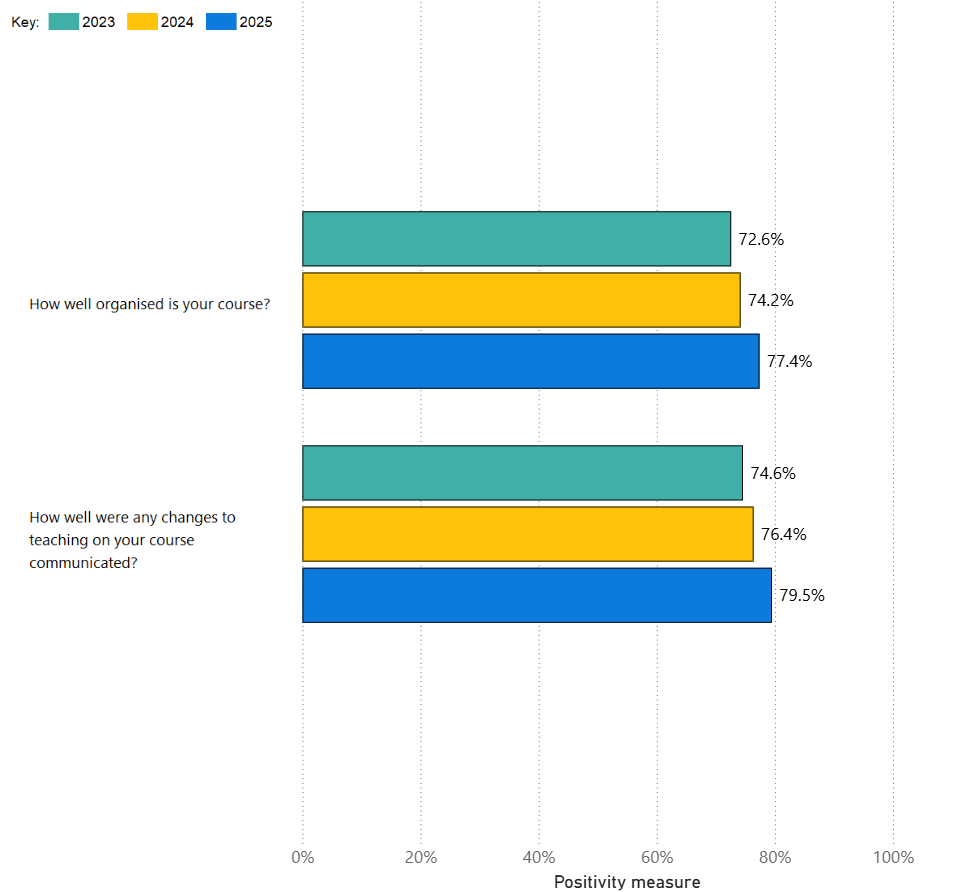
Additional findings
Apprenticeship students and subject areas that have a strong placement element (medicine and dentistry and other medical-related subjects) tend to be less positive about organisation and management.
Students with a reported disability are generally less positive about the organisation and management of their course.
QAA resources
Implementing well designed and delivered programmes of study, and putting in place arrangements for the monitoring and enhancement of such programmes, is considered to be key to the successful organisation and management of courses. To support this, QAA offer a range of activities and resources which can be found at:
Membership Resources on Course Approval and Management
As the NSS results show that apprenticeship students tend to be less positive about organisation and management, you may also find the following Membership Resources (and links to relevant Collaborative Enhancement Projects) useful:
Work-based learning and apprenticeships
6. Learning resources
At a glance
- As in previous years, learning resources is the strongest theme across the survey.
- In particular, respondents feel that library resources have supported their learning well – 90.1% of respondents answered positively.
- Students are also asked about IT resources and subject-specific resources, and the majority of respondents are positive about both.
Around 90% of respondents feel library resources support their learning well
Positivity measure by question for the learning resources theme
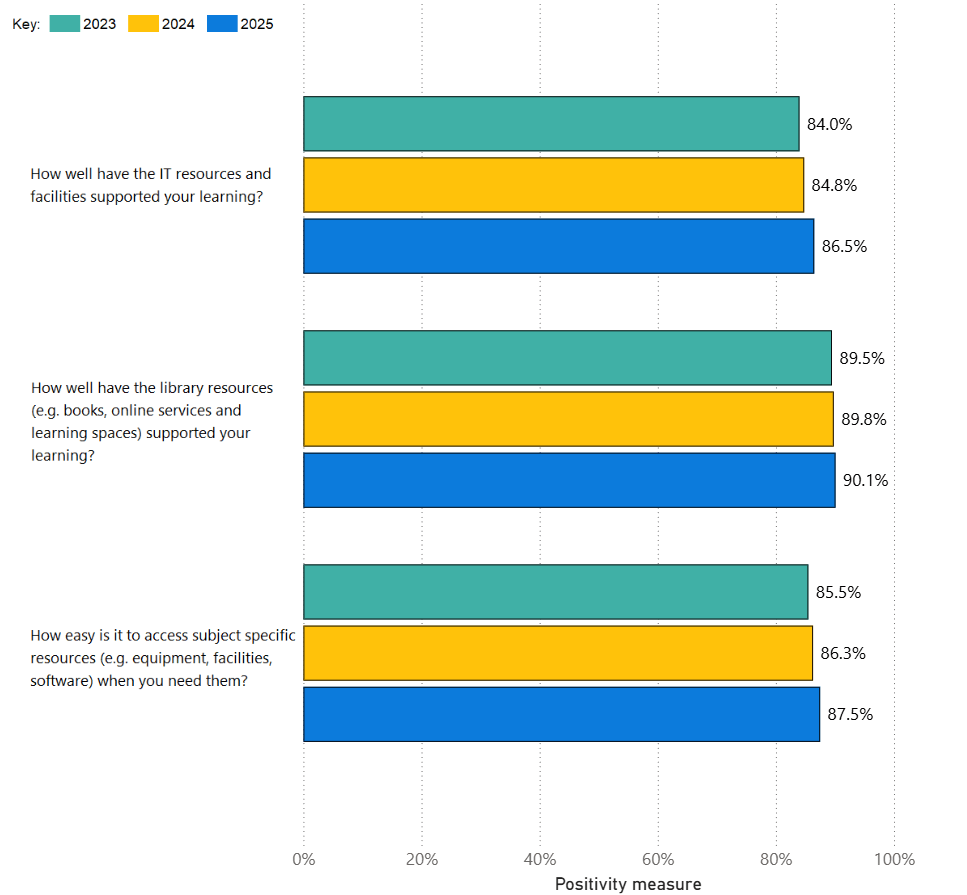
QAA resources
When the increasing use of GenAI emerged, including as a potentially valuable learning resource, QAA curated a wide range of sector resources which may be useful and can be found here:
Generative artificial intelligence
You can keep an eye on emerging sector practice and latest developments through our Collaborative Enhancement Projects focusing on Generative AI.
7. Student voice
At a glance
- Student voice has been the weakest area each year, though there has been strong improvement this year.
- Over four-fifths of respondents feel they get the right opportunities to give feedback (84.7%). This drops to 79.9% of respondents who feel their opinions about the course are valued by staff.
- Around two-thirds of respondents think it’s clear that student feedback is acted on (67.9%). This is an improvement of 4.6 percentage points on last year – the biggest improvement across all questions.
Most respondents feel they have the opportunity to give course feedback but fewer are clear on how it is acted on
Positivity measure by question for the student voice theme
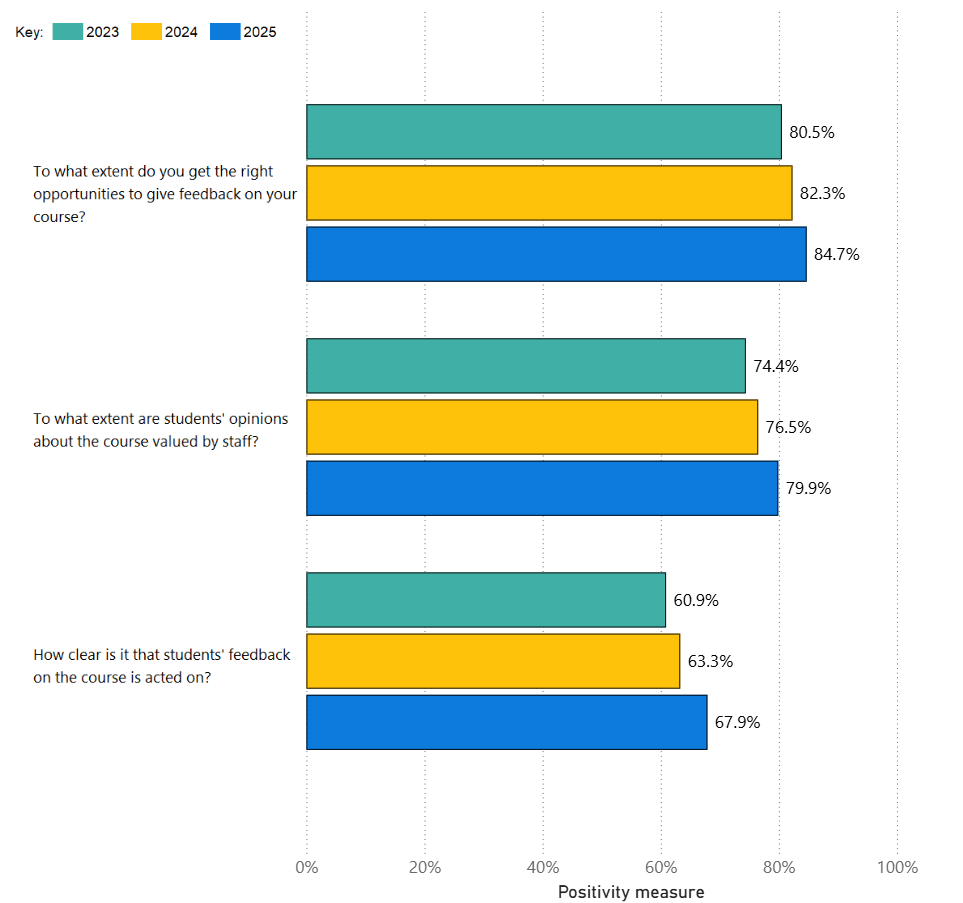
Additional findings
Part-time students have a less positive view in this area than full-time students, particularly in feeling that their feedback is acted on – 58.0% of part-time students felt this was clear compared to 68.7% of full-time students.
Results are also less positive for students on distance learning courses – 75.2% feel they get the right opportunities to give feedback on their courses and 56.7% think it’s clear that student feedback is acted on.
QAA resources
The Enhancement Themes programme of activity has a range of resources and examples of practice on Responding to the Student Voice.
You will also find a wide range of Member Resources relevant to student engagement more broadly at the Student Engagement Resource Hub.
You may find a number of the following projects to be helpful: Collaborative Enhancement Projects on Student Experience and Engagement.
Summary
The results of this year’s NSS show a positive picture overall and year on year improvements at the sector level. We hope this summary helps you put your own performance into context and provides useful signposts to QAA Member resources to help you continue to enhance the student experience.
Please refer to the UK Quality Code for Higher Education, including its Principles, Advice and Guidance, Subject Benchmark Statements, and Characteristics Statements, as essential reference points that support and secure academic standards and enhance quality processes. These guiding documents are designed to help you ensure that students are supported in achieving their academic, personal and professional goals.
We also encourage you to engage with QAA networking communities, events, publications, CPD activities, policy updates and data insights, where good practice is shared and discussed through a quality enhancement lens.
Sign up to our newsletters to receive regular updates on the above direct to your inbox.

